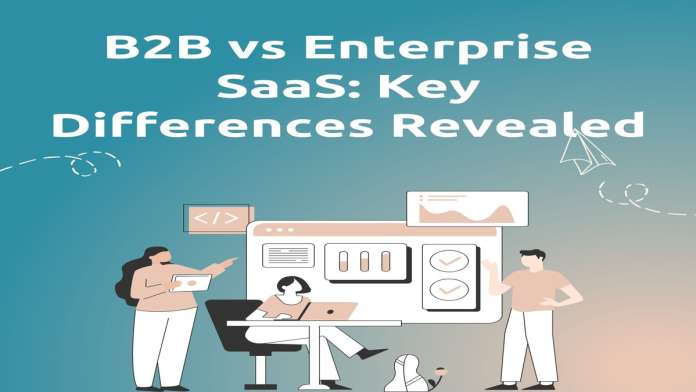In today’s fast-evolving digital landscape, Software as a Service (SaaS) has emerged as a game-changer for businesses of all sizes, particularly when comparing B2B vs. Enterprise SaaS solutions. SaaS is a cloud-based service where, instead of downloading software on your desktop PC or business network to run and update, you access an application via an internet browser. The software application could be anything from office software to unified communications among a wide array of business apps that are used in multiple ways.
Importance of SaaS in Modern Business:
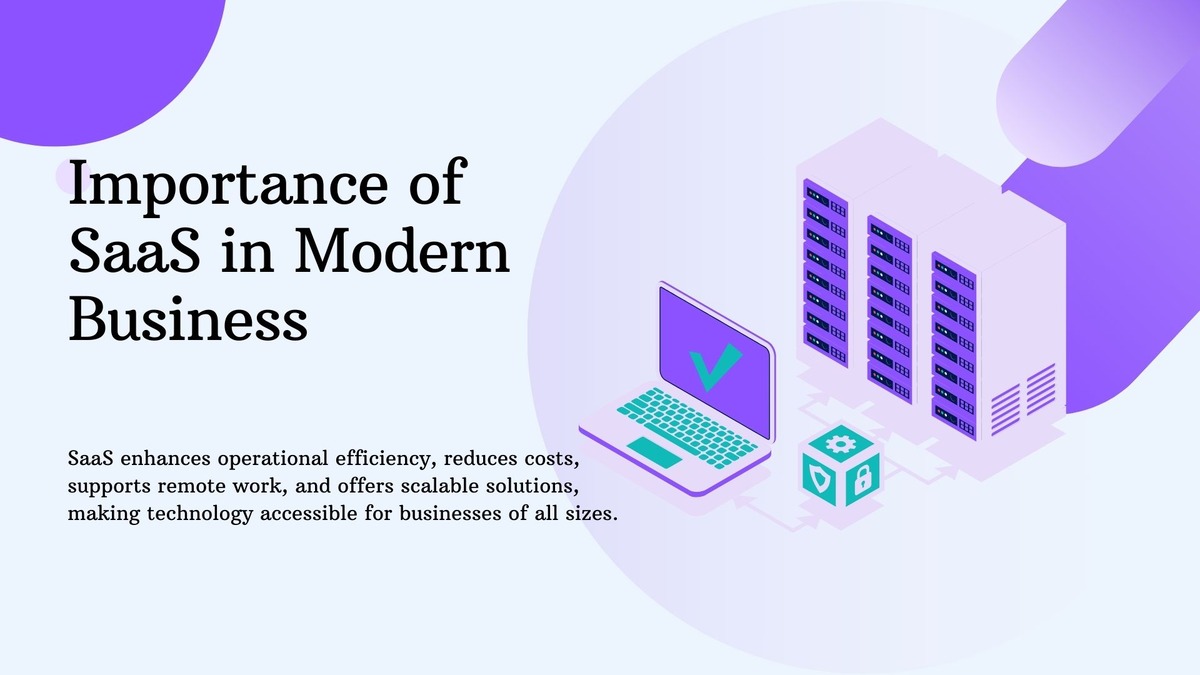
The beauty of SaaS lies in its simplicity and accessibility. Unlike traditional software that requires hefty upfront investments and intricate setups, SaaS models operate on a subscription basis, typically offering lower costs and easier scalability. This cost-effectiveness and ease of use have attracted small start-ups and large enterprises alike, fueling the growth and importance of SaaS in the business world.
The SaaS market has witnessed exponential growth over the years, driven by the rise in internet adoption, the growing need for remote work solutions, and the inherent flexibility of cloud-based services. Gartner forecasts that the SaaS market will grow to $151 billion by 2023, highlighting its critical role in modern business operations.
Whether you run a small B2B service or an expansive enterprise, understanding the nuances of different SaaS models is crucial for leveraging them effectively. In this article, we’ll delve deeper into the distinctions between B2B SaaS vs Enterprise SaaS, helping you make informed decisions for your software needs.
Defining B2B SaaS
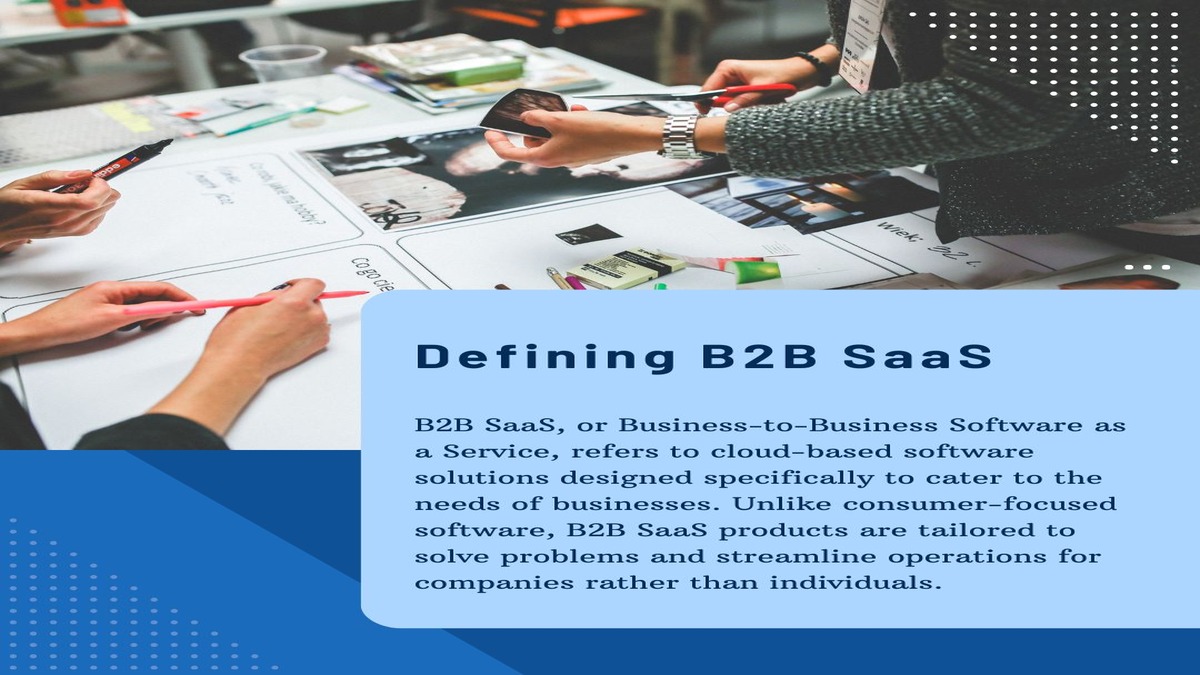
B2B SaaS, or Business-to-Business Software as a Service, refers to cloud-based software solutions designed specifically to cater to the needs of businesses. Unlike consumer-focused software, B2B SaaS products are tailored to solve problems and streamline operations for companies rather than individuals.
-
Enhancing Business Efficiency:
A defining characteristic of B2B SaaS is its ability to enhance business processes. These solutions typically offer features such as customer relationship management (CRM), project management, and marketing automation. For instance, popular B2B SaaS tools like Salesforce, Asana, and HubSpot help organizations manage their customer interactions, project workflows, and marketing campaigns efficiently.
-
Subscription-Based Benefits:
Another key aspect of B2B SaaS is its subscription-based model. Companies pay a recurring fee to access the software, which is hosted on the provider’s servers. This eliminates the need for businesses to invest heavily in infrastructure and maintenance, allowing them to scale their operations seamlessly.
-
Cloud Accessibility and Flexibility:
B2B SaaS solutions are also known for their accessibility and ease of use. Since these applications are hosted in the cloud, users can access them from anywhere, at any time, and on any device with internet connectivity. This flexibility is particularly beneficial for remote teams and distributed workforces.
In summary, B2B SaaS is all about providing businesses with robust, scalable, and versatile software tools that drive productivity and growth. With its subscription-based model and cloud-based accessibility, B2B SaaS has become a cornerstone for modern business operations, helping organizations stay agile and competitive in a fast-paced market.
Understanding Enterprise SaaS
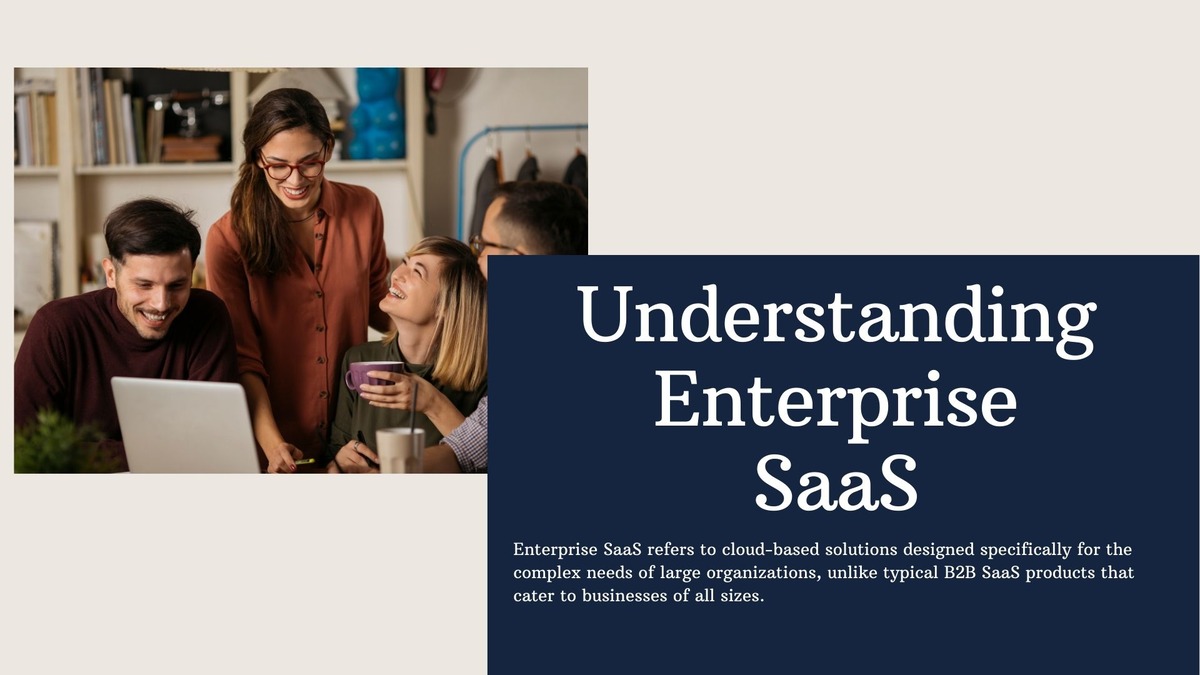
Enterprise SaaS (Software as a Service) refers to cloud-based solutions specifically designed to meet the complex and large-scale needs of big organizations. Unlike typical B2B SaaS products that cater to businesses of varying sizes, enterprise SaaS solutions target large corporations with thousands of employees and multiple departments.
- Customization in Enterprise SaaS Solutions: One defining feature of enterprise SaaS is its ability to handle extensive customization. Large corporations often have unique processes and specific requirements. Enterprise SaaS platforms like Salesforce, SAP, and Oracle Cloud offer robust customization capabilities to tailor the software according to the organization’s precise needs. This customization can range from personalized dashboards and workflows to specific security protocols and data governance policies.
- Scalability: Another key feature is scalability. As organizations grow, their software needs to scale seamlessly without performance issues. Enterprise SaaS platforms are designed to manage heavy workloads and a large number of users while maintaining high performance. This is crucial for operations that cannot afford downtime or lag, such as multinational corporations.
- Seamless Integration: Moreover, integration is a cornerstone of enterprise SaaS solutions. These platforms need to work smoothly with various other software systems—be it HR, ERP, or CRM solutions—that the corporation already uses. This integration capability ensures a unified and efficient workflow across different departments.
- Security & Compliance: Security and compliance are also critical aspects. Enterprise SaaS solutions must comply with rigorous industry standards and regulations, such as GDPR for data protection or HIPAA for healthcare information. High-level security features like advanced encryption, multi-factor authentication, and regular audits are common in enterprise SaaS.
- Enterprise SaaS Case Studies: Case studies provide tangible examples of how enterprise SaaS can transform operations. For instance, a multinational bank might use an enterprise SaaS platform to centralize customer data, enhancing both customer experience and internal efficiency. Another example could be a global retailer leveraging enterprise SaaS for inventory management, resulting in optimized supply chains and reduced operational costs.
In summary, enterprise SaaS solutions are designed to cater to the sophisticated and large-scale needs of major corporations, offering features like extensive customization, high scalability, seamless integration, and robust security.
Market Segmentation Differences
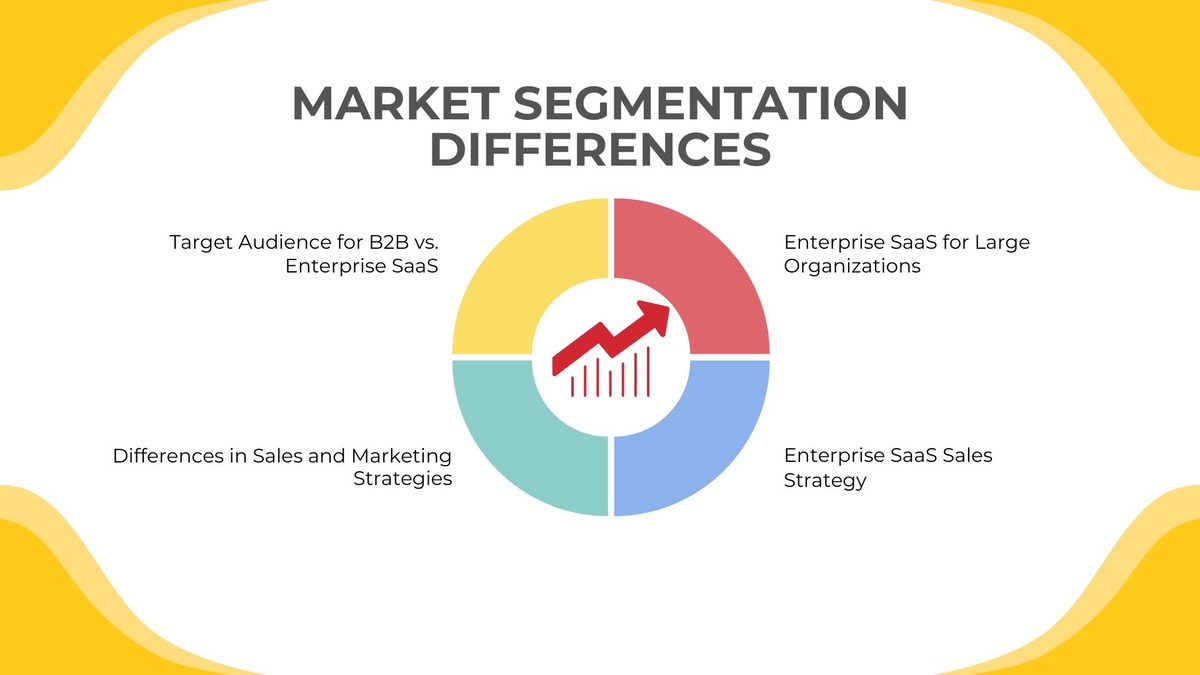
When exploring the differences between B2B SaaS and enterprise SaaS, understanding market segmentation is crucial. Both types serve distinct audiences and require tailored sales and marketing approaches.
-
Target Audience for B2B vs. Enterprise SaaS:
B2B SaaS, short for Business-to-Business Software as a Service, typically targets small to medium-sized companies. These businesses often look for cost-effective, easy-to-implement solutions that can streamline their operations and boost productivity. Common examples of B2B SaaS include project management tools like Trello, CRM systems like HubSpot, and accounting software like QuickBooks.
-
Enterprise SaaS for Large Organizations:
On the other hand, enterprise SaaS is designed for large organizations with complex needs. Enterprise solutions prioritize comprehensive features, customization, and scalability, catering to industries such as healthcare, finance, and large-scale manufacturing. Platforms like Salesforce, SAP, and Oracle are notable examples of enterprise SaaS providers.
-
Differences in Sales and Marketing Strategies:
Sales and marketing strategies vary significantly between B2B vs enterprise SaaS. B2B SaaS companies often employ inbound marketing techniques such as SEO, content marketing, and social media campaigns to attract a broad audience. The sales cycle is generally shorter, and the decision-makers are likely to be individual managers or small business owners.
-
Enterprise SaaS Sales Strategy:
Conversely, enterprise SaaS providers rely heavily on a personalized, relationship-driven approach. The sales process usually involves multiple stakeholders, from IT managers to C-level executives, and can take months or even years to complete. Tactics such as account-based marketing, direct sales teams, and industry-focused events are common.
-
Selecting the Right SaaS Model:
Recognizing these market segmentation differences can help businesses choose the right SaaS model that aligns with their goals and operational needs. Whether you’re a small business or a large corporation, understanding your target audience and deploying the right marketing strategies are key to maximizing the benefits of SaaS.
Functional and Technical Distinctions
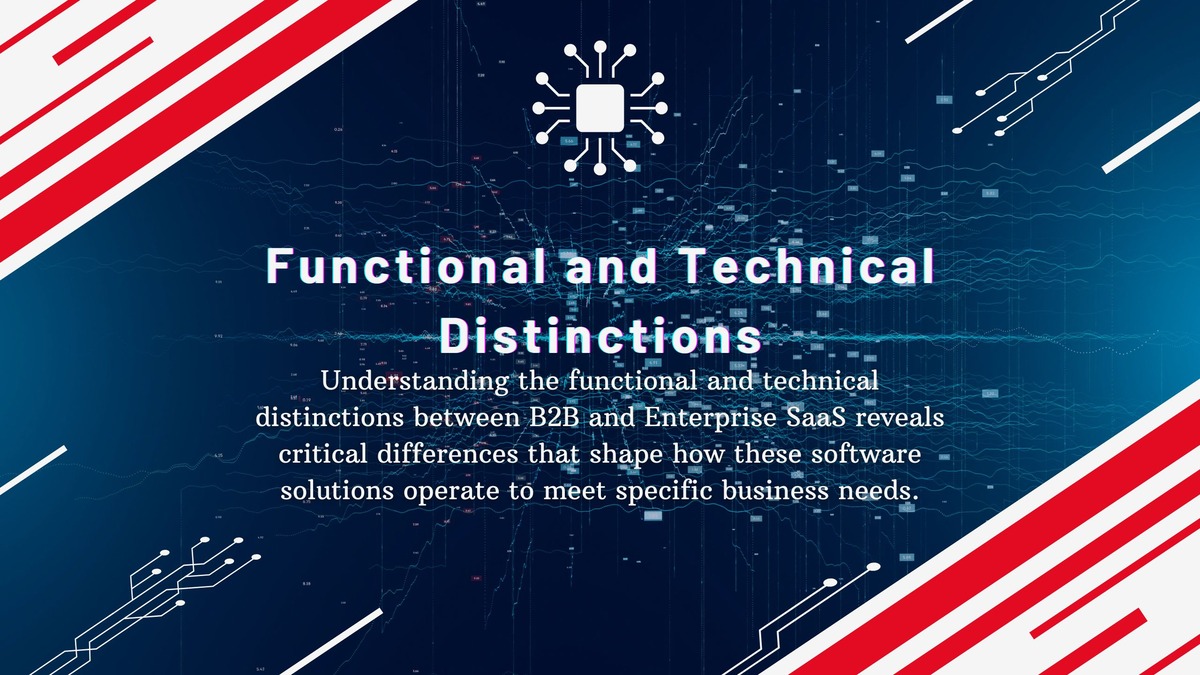
When it comes to understanding the functional and technical distinctions between B2B vs Enterprise SaaS, several critical differences emerge. These differences essentially shape how these software solutions operate and meet specific business needs.
-
Customization and Scalability:
B2B SaaS applications are generally designed for small to mid-sized businesses, providing solutions that are straightforward and ready to deploy. These apps usually offer basic customization options to suit a broad range of industry needs. On the other hand, Enterprise SaaS solutions often cater to large-scale organizations that demand robust customization to align the software with their complex workflows. The scalability of Enterprise SaaS is typically extensive, allowing businesses to add users, processes, and functionalities as they grow without compromising performance.
-
Integration and Compliance Considerations:
B2B SaaS solutions are built to integrate seamlessly with widely-used business tools, ensuring a smooth workflow for small businesses. These integrations often involve popular CRMs, communication tools, and project management platforms. In contrast, Enterprise SaaS focuses heavily on deep integration capabilities with comprehensive enterprise resource planning (ERP) systems, customer databases, and other critical business software. Compliance is another significant factor; Enterprise SaaS often meets rigorous regulatory requirements pertinent to industries like finance, healthcare, and government, which might not be as emphasized in B2B SaaS.
-
Selecting the Right SaaS Solution:
Understanding these functional and technical distinctions can help businesses choose a SaaS solution that best aligns with their size, complexity, and growth trajectory. For a small business, a ready-to-use B2B SaaS platform may suffice, while a large corporation will likely benefit more from a deeply customizable and scalable Enterprise SaaS solution. Choose wisely to ensure optimal performance and ROI.
Choosing the Right SaaS Solution for Your Business
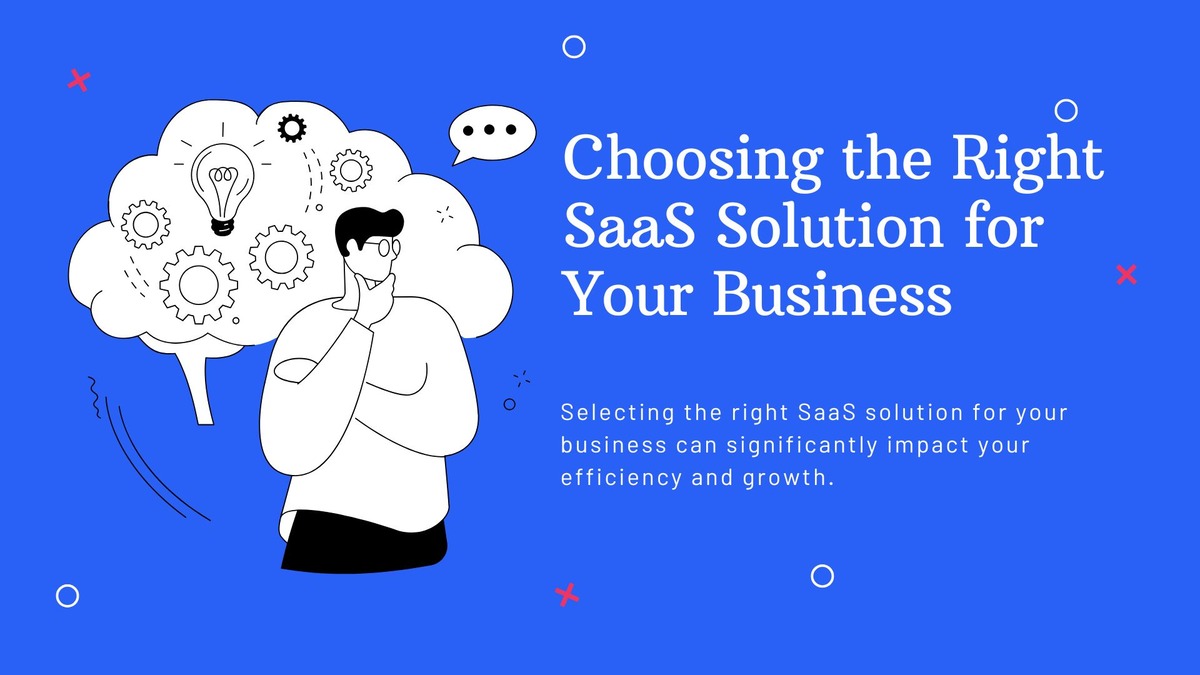
Selecting the right SaaS solution for your business can significantly impact your efficiency and growth. When deciding between B2B SaaS and Enterprise SaaS, consider several crucial factors:
- Business Size and Growth Plans: If you run a small to medium-sized business aiming for scalability, B2B SaaS solutions might be more fitting. They are generally easier to implement and cost-effective. Conversely, for larger organizations with complex needs and higher budgets, Enterprise SaaS platforms offer tailored functionalities and extensive support.
- Customization Needs: Evaluate how much customization your business operations require. B2B SaaS solutions often provide standardized features that work well out of the box. Enterprise SaaS, on the other hand, allows for in-depth customization, ensuring the software fits perfectly with your unique processes.
- Integration with Existing Systems: Consider how well a SaaS solution integrates with your current software stack. Enterprise SaaS platforms typically offer robust integration capabilities, making them suitable for businesses with diverse and complex IT environments.
- Compliance and Security: For industries with strict regulatory requirements, Enterprise SaaS solutions provide comprehensive compliance and security measures. B2B SaaS solutions also offer secure environments but might not be as exhaustive as Enterprise platforms.
- Cost Considerations: Budget is a critical factor. B2B SaaS typically involves lower upfront costs and offers flexible pricing plans. Enterprise SaaS might require a significant investment but provides scalability and tailored features that could justify the expense.
- Vendor Support and Training: Robust customer support and training services are essential for smooth implementation and ongoing usage. Enterprise SaaS vendors usually offer extensive support options, including dedicated account managers and custom training sessions. B2B SaaS solutions may offer good but more standardized support packages.
Ultimately, the choice depends on understanding your business needs, growth trajectory, and financial capacity. Assess these elements carefully to select a SaaS solution that will drive your business forward efficiently.
Read More: Top 10 Popular SaaS Marketing Blogs in 2024

